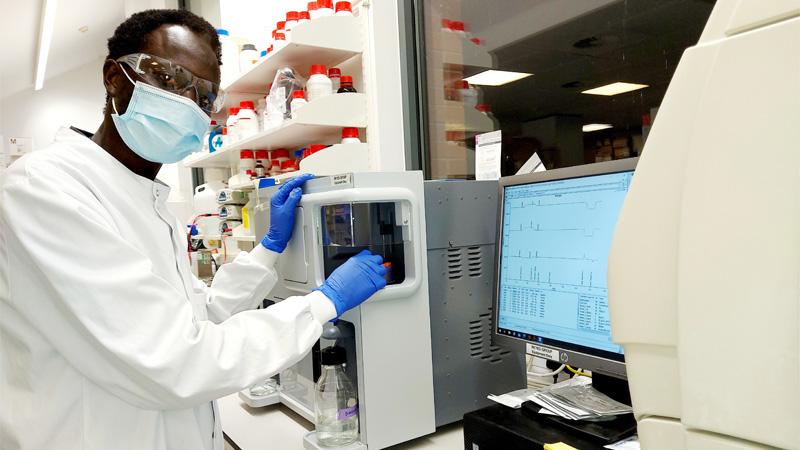In these unprecedented times, the University has been proud to see its students, colleagues, alumni and friends rally together to offer a helping hand to those in our communities and beyond, making a huge difference throughout the COVID-19 pandemic. One year on since the first coronavirus lockdown in the UK, we look back at some of the examples of these remarkable efforts.

1. Westminster alumnus leads the way in the COVID-19 vaccination journey
Westminster alumnus Dr Mustapha Bittaye, who is a Postdoctoral Scientist at the Jenner Institute, University of Oxford, is one of the core team of scientists who worked on the Oxford-AstraZeneca COVID-19 vaccine. Dr Bittaye graduated from Westminster in 2012, describing his time at the University as “the defining moment of my career that laid the foundation for everything I went on to achieve”. His previous work with colleagues in their MERS-CoV vaccine trial became the blueprint for the COVID-19 vaccine programme, which began its rollout in the UK on 4 January.
2. Contributing to the understanding and impacts of COVID-19 with research
Set to make a long-term difference during and beyond the COVID-19 pandemic, 23 coronavirus response-related projects undertaken by Westminster’s Research Communities received over £200,000 in funding which was generously provided by the Quintin Hogg Trust. The wide range of projects tackle a variety of important issues, from the impact of COVID-19 symptoms and ill-health on decision-making biases in key workers, to how COVID-19 will impact on future planning and design of sustainable and healthy cities.
3. Students raise over £100,000 for Westminster’s COVID-19 Response Fund
As part of the annual telephone campaign, 40 Westminster students contacted over 1,000 alumni to hear about their experiences at the University and raise money to support the COVID-19 Response Fund, where they raised £109,197. The Fund aims to support students who are suffering from financial hardship caused by the pandemic to help with living costs including rent, food or medical costs.
4. Academic organises virtual public health awareness workshops to support remote communities
By developing innovative research techniques virtually to help facilitate community action, Tumpa Fellows from the School of Architecture + Cities has helped remote communities to contain the coronavirus outbreak despite having to suspend physical research fieldwork. The project focused on the prevention of infection through participatory workshops explaining the importance of social distancing, distribution of soaps and demonstrating of handwashing, wearing masks and how to access emergency medical assistance.
5. Providing mental health support to students and the wider community
Westminster academics launched a resource website in response to the mounting pressure on individuals taking on support roles amid deteriorating mental health levels, significantly reduced mental health provision and increased isolation due to the COVID-19 pandemic. The website called ‘CHERISH’ provides much-needed resources for those providing support to university students who have experience with self-harm.
Psychology academics also teamed up with NHS psychologists to launch an online tool offering mental health support during the pandemic. The online tool, called ‘Helpers’, is a six-week free course which uses psychological theory and techniques to address different aspects of wellbeing.
6. Providing expert advice to the public
University of Westminster academics have rallied to provide expert advice to the public through media channels, helping to get through the coronavirus outbreak. Westminster academics have advised on hand washing, hand sanitisers, face masks, economic and financial issues, the lessons to learn from the HIV epidemic, job retention, mental health, lockdown workout routines and public transport, among other things.
7. Westminster students and academics volunteering
University of Westminster Life Sciences academics volunteered in the UK Biocentre COVID-19 testing laboratory in Milton Keynes, and in other laboratories and NHS facilities, contributing to reaching the daily testing target. Their skills used in the testing processes have been invaluable in the effort to defeat the virus. Other academics and students across the University have also volunteered for the NHS, food banks and charities to help vulnerable communities during the pandemic. The University’s Change for Good initiative also actively promoted volunteering opportunities to support students who were interested in volunteering but were not sure where to start.
8. Transferring crucial testing equipment to a major coronavirus testing facility
The University of Westminster transferred a piece of high-tech testing equipment to the Government’s COVID-19 testing unit in Milton Keynes to help the UK fight the coronavirus crisis by limiting the transfer of the disease. The crucial equipment has contributed to ramping up testing efforts using a so-called Polymerase chain reaction-based assay.
9. Printing masks for the NHS and care homes
University of Westminster academics used their expert skills, as well as equipment from the University’s high-tech Fabrication Lab and Emerging Media Space, to 3D-print face shields to protect NHS and care workers from catching coronavirus. The acetate visor shields are an essential part of personal protective equipment for frontline workers.
10. Purchasing laptops for students in need
The University joined forces with Santander Universities to help all students in need to purchase laptops so that they could study remotely and not risk falling behind. The ten-year long partnership with Santander Universities continues to help Westminster students reach their true potential and benefit from life-changing experiences.
Find out more about the University of Westminster's coronavirus response.











